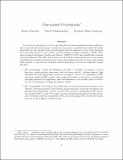| dc.contributor.author | Degwekar, Akshay Dhananjai | |
| dc.contributor.author | Vaikuntanathan, Vinod | |
| dc.contributor.author | Vasudevan, Prashant | |
| dc.date.accessioned | 2017-08-30T17:35:22Z | |
| dc.date.available | 2017-08-30T17:35:22Z | |
| dc.date.issued | 2017-08-30 | |
| dc.identifier.isbn | 978-3-662-53014-6 | |
| dc.identifier.isbn | 978-3-662-53015-3 | |
| dc.identifier.issn | 0302-9743 | |
| dc.identifier.issn | 1611-3349 | |
| dc.identifier.uri | http://hdl.handle.net/1721.1/111069 | |
| dc.description.abstract | Fine-grained cryptographic primitives are ones that are secure against adversaries with an a-priori bounded polynomial amount of resources (time, space or parallel-time), where the honest algorithms use less resources than the adversaries they are designed to fool. Such primitives were previously studied in the context of time-bounded adversaries (Merkle, CACM 1978), space-bounded adversaries (Cachin and Maurer, CRYPTO 1997) and parallel-time-bounded adversaries (Håstad, IPL 1987). Our goal is come up with fine-grained primitives (in the setting of parallel-time-bounded adversaries) and to show unconditional security of these constructions when possible, or base security on widely believed separation of worst-case complexity classes. We show:
1. NC¹-cryptography: Under the assumption that Open image in new window, we construct one-way functions, pseudo-random generators (with sub-linear stretch), collision-resistant hash functions and most importantly, public-key encryption schemes, all computable in NC¹ and secure against all NC¹ circuits. Our results rely heavily on the notion of randomized encodings pioneered by Applebaum, Ishai and Kushilevitz, and crucially, make non-black-box use of randomized encodings for logspace classes.
2. AC⁰-cryptography: We construct (unconditionally secure) pseudo-random generators with arbitrary polynomial stretch, weak pseudo-random functions, secret-key encryption and perhaps most interestingly, collision-resistant hash functions, computable in AC⁰ and secure against all AC⁰ circuits. Previously, one-way permutations and pseudo-random generators (with linear stretch) computable in AC⁰ and secure against AC⁰ circuits were known from the works of Håstad and Braverman. | en_US |
| dc.description.sponsorship | United States. Defense Advanced Research Projects Agency (Contract W911NF-15-C-0226) | en_US |
| dc.description.sponsorship | United States. Army Research Office (Contract W911NF-15-C-0226) | en_US |
| dc.language.iso | en_US | |
| dc.publisher | Springer | en_US |
| dc.relation.isversionof | http://dx.doi.org/10.1007/978-3-662-53015-3_19 | en_US |
| dc.rights | Creative Commons Attribution-Noncommercial-Share Alike | en_US |
| dc.rights.uri | http://creativecommons.org/licenses/by-nc-sa/4.0/ | en_US |
| dc.source | MIT Web Domain | en_US |
| dc.title | Fine-Grained Cryptography | en_US |
| dc.type | Article | en_US |
| dc.identifier.citation | Degwekar, Akshay et al. “Fine-Grained Cryptography.” Advances in Cryptology – CRYPTO 2016. Lecture Notes in Computer Science 9816 (2016): 533–562. © 2016 International Association for Cryptologic Research | en_US |
| dc.contributor.department | Massachusetts Institute of Technology. Computer Science and Artificial Intelligence Laboratory | en_US |
| dc.contributor.department | Massachusetts Institute of Technology. Department of Electrical Engineering and Computer Science | en_US |
| dc.contributor.mitauthor | Degwekar, Akshay Dhananjai | |
| dc.contributor.mitauthor | Vaikuntanathan, Vinod | |
| dc.contributor.mitauthor | Vasudevan, Prashant | |
| dc.relation.journal | Advances in Cryptology – CRYPTO 2016 | en_US |
| dc.eprint.version | Author's final manuscript | en_US |
| dc.type.uri | http://purl.org/eprint/type/ConferencePaper | en_US |
| eprint.status | http://purl.org/eprint/status/NonPeerReviewed | en_US |
| dspace.orderedauthors | Degwekar, Akshay; Vaikuntanathan, Vinod; Vasudevan, Prashant Nalini | en_US |
| dspace.embargo.terms | N | en_US |
| dc.identifier.orcid | https://orcid.org/0000-0002-8354-0621 | |
| dc.identifier.orcid | https://orcid.org/0000-0002-2666-0045 | |
| dc.identifier.orcid | https://orcid.org/0000-0002-0522-7023 | |
| mit.license | OPEN_ACCESS_POLICY | en_US |
